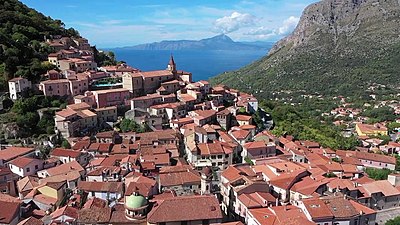MARATEA
Maratea is situated on the slopes of Monte
San Biagio, facing the splendid Tyrrhenian coast of the Policastro
Gulf.
History
Its foundation is thought to have happened during the VIII
century BC by Greek colonies arriving by sea. During the IX
century AD, it merged into the Longobard Principality of Salerno
and welcomed refugees from the city of Blanda which was destroyed
by the Saracens.
It was conquered by the Normans and prospered under them during
the XI century, acquiring even more importance as a commercial
port. Its inhabitants left the ancient village on the summit
of Monte San Biagio Maratea to create lower Maratea (XIII
century).
Under the Aragonese, it enjoyed the title of Royal directional
city until 1531, when it was sold to the Carafa family.
During this period, in defence of Turkish attacks, seven lookout
towers were built along the coast.
In 1806, it suffered attack by Napoleonic troops who destroyed
the fortress.
During the XX century, Maratea became popular as one of the
major tourist centres of Basilicata, for the beauty of its
coasts, its background and rich territorial history.
A visit to the City
The City is divided in an superior or upper part which is
much older and an inferior or lower part. Maratea is also
known as the “City of 44 Churches”, a name that
immediately reveals the wealth of its architectonic patrimony.
Along the Maratea shoreline, one can enjoy interesting excursions
to natural grottoes. While close by, on the small island of
Santo Janni, a great deposit of amphoras and Roman anchors
have been recovered, which can now been seen at the Underwater
Archaeological Exhibition and at the De Lieto Museum.
Place of interest
The S. Maria Maggiore Matrix Church; San Biagio Sanctuary;
Calvario Church; San Vito Church (XI-XIII century); Annunziata
Church; Madonna del Rosario Church; Palazzo De Lieto; Immacolata
Church (XVIII century); Addolorata Church (XIX century); Sant’Antonio
Church; San Francesco Church; Ruins of ancient Maratea; Maratea
Towers; Coastal Towers; Belvedere del Redentore; Marina Grotto.
|
